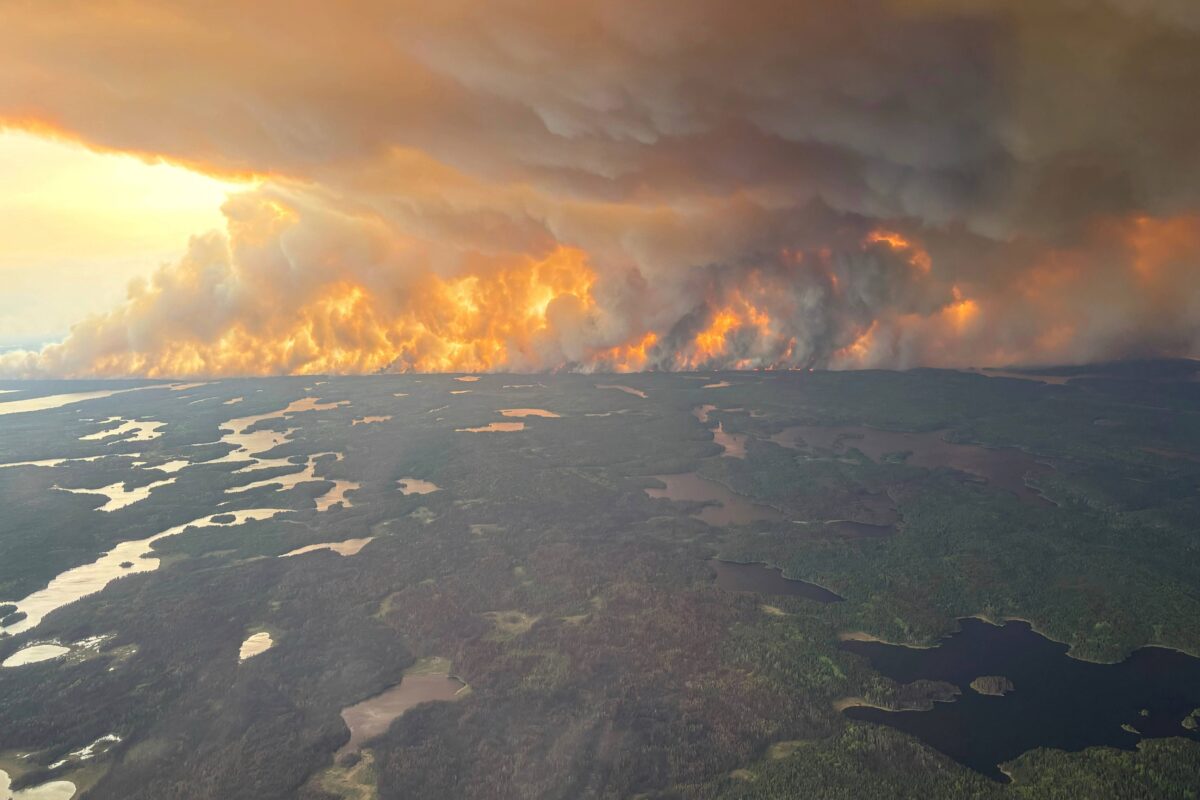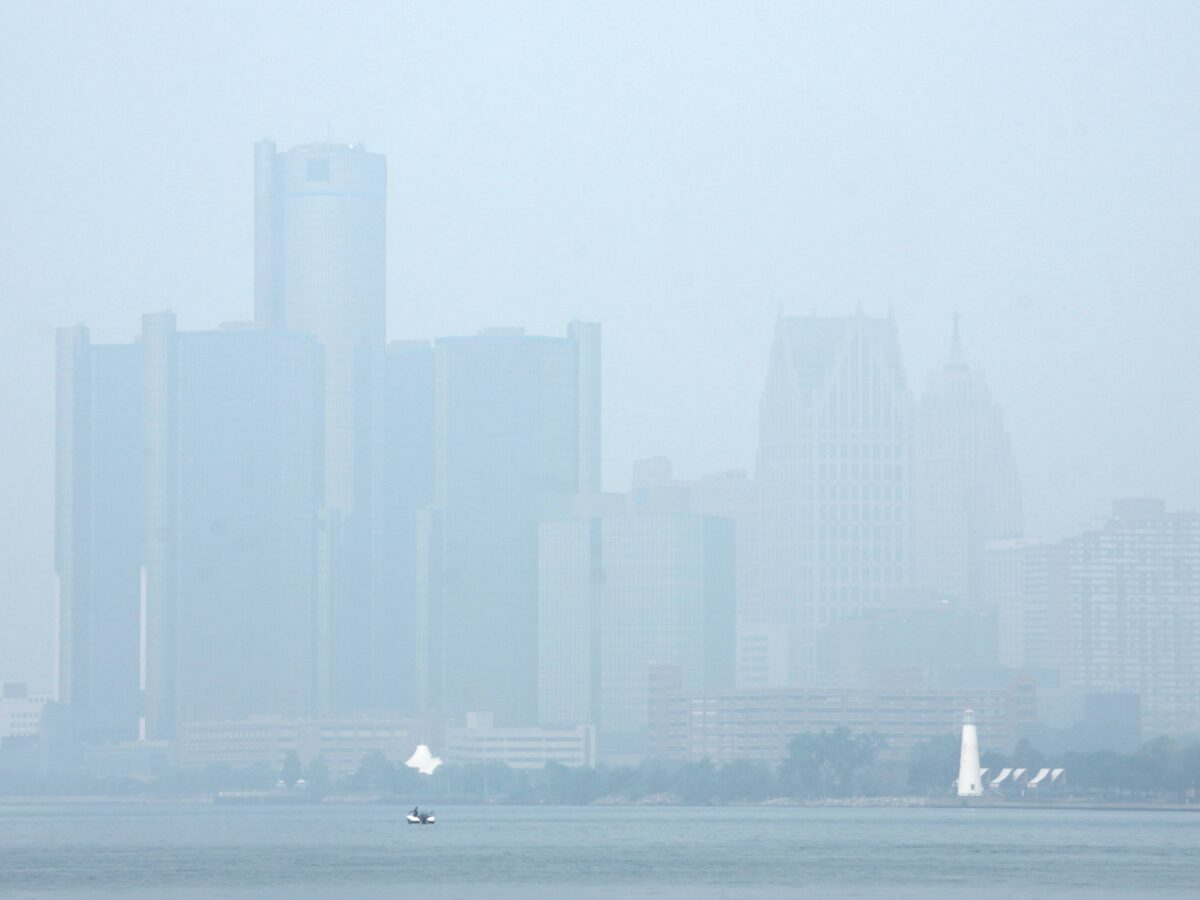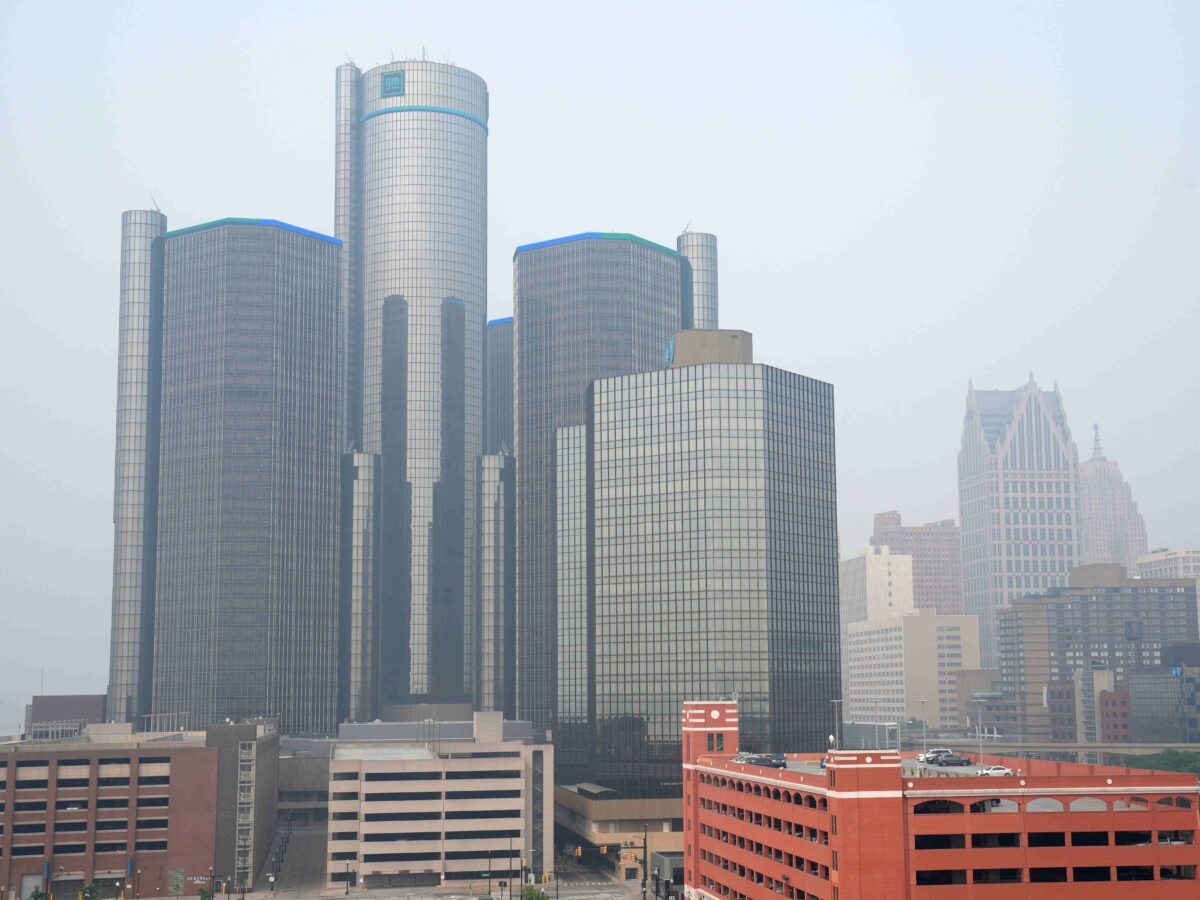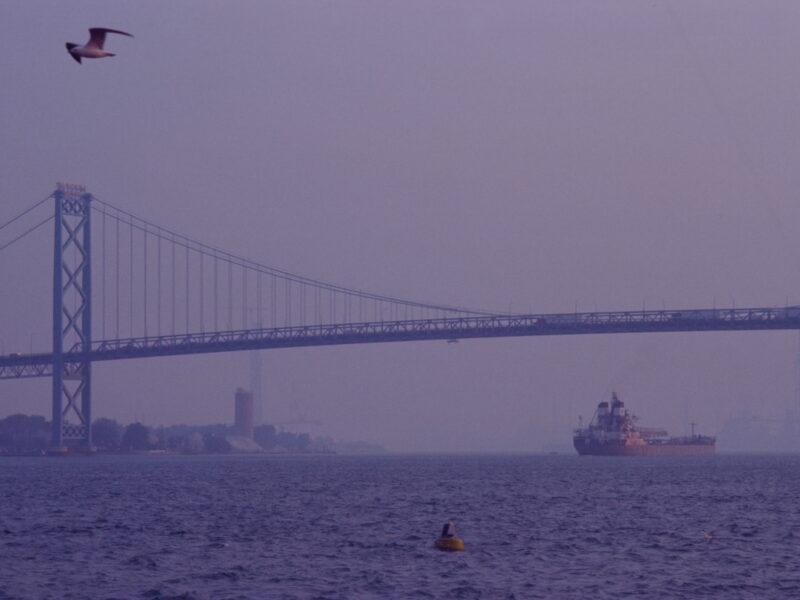Overview:
-"That's a drop in the bucket," Macomb County Public Works Commissioner Candice Miller says of Canada's $284 million investment in wildfire resilience efforts.
-Canadian fire official says the U.S. provided strong support early in the fire season, but is now at a high state of preparedness for domestic fires.
-Miller's Aug. 1 letter that calls the wildfires behind poor air quality in Michigan "uncontrolled" was followed by more missives from Republican politicians.
Candice Miller can’t help but check the air quality app on her phone every day. Like her constituents in Macomb County, she has spent much of the summer weathering the Canadian wildfire smoke making its way through Michigan.
“We’re walking around in this smoke all the time,” Miller told Planet Detroit. “I never used to look at it (the air quality app). Now I’m looking at it twice a day, because I’ll notice as I’m walking around, I feel a little short of breath. I’m in a haze.”
With over 18 million acres of land in Canada burned due to wildfires this year, the 2025 wildfire season is on pace to be the second-most intense season on record, according to Canadian officials, trailing behind the historic 2023 season, when more than 42 million acres of land burned.
As Macomb County’s public works commissioner, Miller has spent the last decade managing the region’s stormwater system, collaborating with county officials to “build bigger retention basins” as Southeast Michigan experiences more frequent and intense rain events.
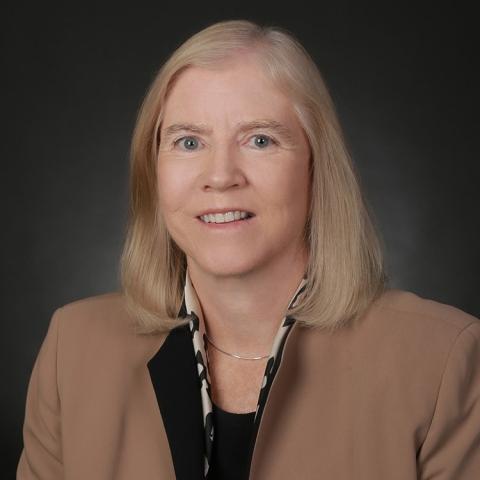
As the area has seen multiple poor air quality days in recent weeks, she’s pivoted toward addressing another extreme weather issue.
On Aug. 1, Miller penned a letter to the U.S. Ambassador to Canada Pete Hoekstra, calling on the longtime Michigan politician and her former colleague in the U.S. House of Representatives to “press Canadian officials to increase efforts combating wildfires that are causing poor air quality in Michigan and other states.
“It’s unacceptable for our friends in Canada to simply say, ‘The fires will burn out’ or ‘Wait until December,’” Miller said in the letter.
GOP outcry over summer wildfire smoke
Almost overnight, Miller’s letter was followed by similar missives from other Republican politicians, as well as a statement from Hoekstra, who acknowledged the wildfires “are causing immense hardship and have forced families to evacuate their homes and communities” in Canada.
“Poor air quality here in Ottawa, across Canada, and in the United States caused by the wildfires is a stark reminder of the shared challenges we face and the importance of working together to protect lives, communities, and natural resources,” Hoekstra said in an Aug. 5 letter.
Over 800 U.S. firefighters have supported Canada this season, Hoekstra added, made up of “airtankers, firefighting crews, complex incident management teams, and overhead staff.”
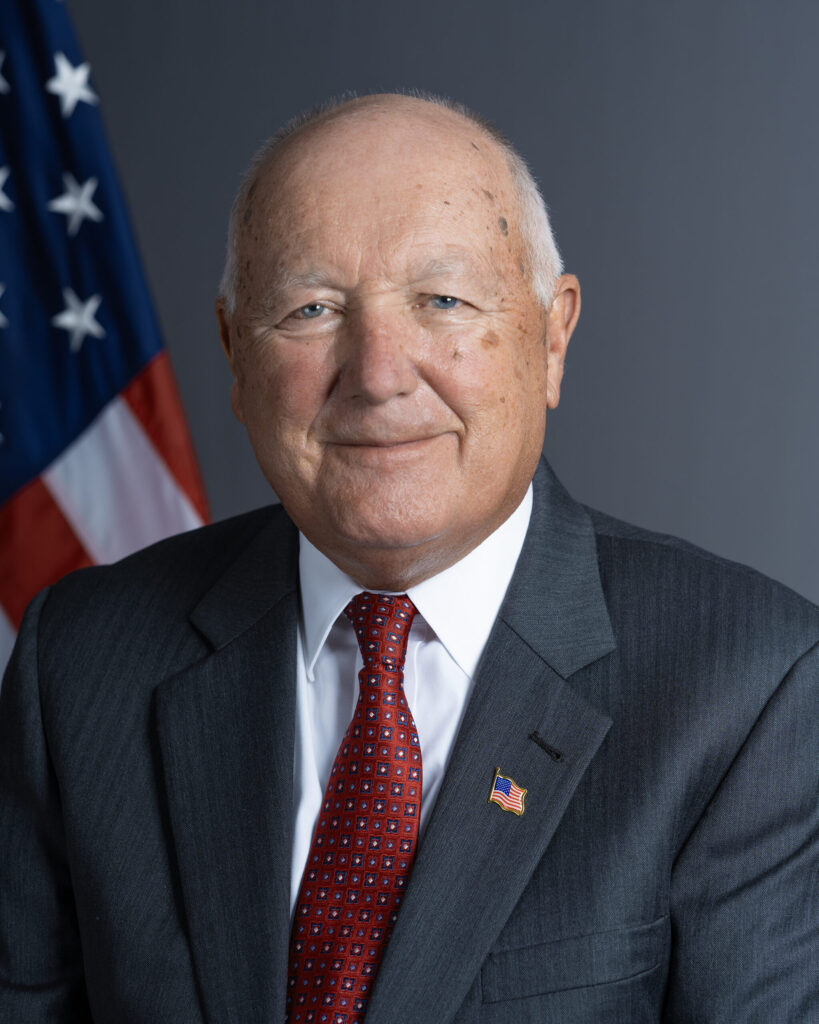
Miller, who singled out Hoekstra in her original letter, said the ambassador’s statement was “great,” but “we need to do better.”
“If they got 800 (firefighters), we need more, and they need more, and we need more resources, because this is unacceptable.”
Miller’s letter criticized Canada’s effort to address wildfires.
“It’s incredibly unneighborly for them to take such a cavalier attitude about their uncontrolled wildfires that now seem to burn on a regular basis every year,” she wrote, adding that the country needs to employ more “aggressive” strategies such as “prescribed controlled burns” of forested land or “mechanical thinning of combustible materials.”
As Canada experiences more droughts and extreme heat, officials expect to “see more intense fire seasons over the years,” according to Awa Cissé, communication officer for the Canadian Interagency Forest Fire Centre.
Much of the wildfire smoke, Cissé said, is coming from the Prairies, western provinces such as Manitoba and Saskatchewan, which have seen some of the most “intense fires” this summer.
The strategies firefighters use to control fires depends on several factors, including weather conditions, such as drought, wind patterns, and lightning, as well as proximity to residences and animal habitats, and the number of available crews and resources.
“Prescribed burning is one approach,” said Brady Holliday, an air operations coordinator for the Society for the Protection of Forests against Fire, or SOPFEU, in an Aug. 7 news conference hosted by the CIFFC.
“At a certain scale, you can do that on a local level, but to be able to try and say that you can have an impact nationally or globally doing this, it’s not super feasible.”
As wildfire seasons worsen, Canada has made greater investments toward improving its wildfire response and management.
In 2023, Canada launched the Wildfire Resilient Futures Initiative, earmarking nearly $300 million for programs that promote community awareness, develop innovations in wildfire mitigation, and reduce health and safety risks. Among them is FireSmart, a nationwide program that, for over 30 years, has administered wildfire prevention and mitigation strategies to Canadian residents and communities.
“Each province and territory has its own (FireSmart) program detailed and modeled after what it needs,” said the CIFFC’s Cissé.
“For BC (British Columbia), they have a lot of fires each year, so their program is bigger than the one, for example, in Prince Edward Island, just because they have less fire issues, even though they’re starting to have more and more because of climate change.”
Since May 29, Cissé added, Canada has been under National Preparedness Level 5, its highest category for wildfire activity, which calls for firefighters in every region of the country to be “put to use, and international help has been requested.” By comparison, in 2023, Canada was under NPL 5 between May 11 and Sept. 7.
The country estimates it annually spends over $1 billion to fight wildland fires.
MORE PLANET DETROIT WILDFIRE COVERAGE
Canadian wildfire smoke triggers Wayne County’s 16th air quality alert of 2025
Detroit’s air ranks fourth worst in the world Monday, according to the index published by the website IQAir — between Baku, Azerbaijan and Jakarta, Indonesia.
What to do when Detroit air is polluted with wildfire smoke
As wildfire smoke drifts across borders, its health impacts are felt unevenly. Vulnerable groups like those with chronic conditions, pregnant women, children, and first responders face heightened risks.
Climate is adding to Detroit air quality problems: American Lung Association
Detroit’s failing air quality grade in the American Lung Association’s State of the Air Report highlights the impact of climate change and wildfire smoke, as over 77 million people nationwide face unhealthy PM 2.5 pollution spikes.
‘I believe in climate change’: Miller
Miller said the nation’s efforts are admirable, but “not enough,” calling for the deployment of military personnel to help mitigate the fires.
“That’s a drop in the bucket,” Miller said of the nation’s $284 million investment in wildfire resilience efforts. “They need to spend a lot more.”
The Canadian Armed Forces is often called upon to address wildfires, particularly to support evacuation efforts in residential areas, and disproportionately in rural Indigenous communities.
Mike McCulley, associate director of operations at CIFFC, said the challenges of this year’s wildfire season has put a strain on the nation’s capacity, and called for additional resources from international partners such as the U.S., Mexico, Chile, and Australia.
“We’ve done everything we can to move the right people to the right fires in the right provinces, but it has driven us to bring in international partners,” McCulley said during the Aug. 7 CIFFC news conference.
“Early in the fire season, we had the strongest amount of support that we got from the United States of America … They are now at a very high state of preparedness themselves so they are unable to send resources currently, but we talk to them regularly.”
During her 13-year tenure as U.S. representative for Michigan’s 10th district, Miller received poor marks from the League of Conservation Voters, which gave her an 11% score for her voting record on air, water, and energy issues.
Miller dismissed the advocacy group’s rating, citing efforts to address water quality issues across the Great Lakes.
“I believe in climate change,” said Miller. “I think it’s happening. I’m not a denier.
“I’ve always considered myself to be an environmentalist,” she said. “I was always a member of the Great Lakes Caucus and I worked on the Great Lakes Restoration Initiative, securing those funds every single year.”
Miller said she’d like to see a bigger federal response, either by the U.S. Secretary of State Marco Rubio, or even President Donald Trump.
“Something has to happen here, and the United States … we need to help. We can help,” she said.
“We’re getting impacted, and they’re our friends and neighbors, but somehow we got to get a brain trust to really have a much more aggressive, robust response to this, because we can’t go through this every summer.”

